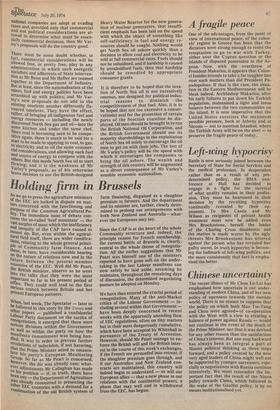Oit
ationalism
There is no good reason why this country, in its handling of North Sea oil, should treat the multinational giants of the oil industry with a great deal more generosity than do the present OPEC countries; yet this is what most critics of the Government's oil policy apparently want. Objection has been made to "economic nationalism" coming into the policy announced by Mr Eric Varley, as if economic nationalism were something abhorrent to reason and to Tory philosophy alike. Many people, inside and outside the Conservative Party, will feel that we have not had anything like enough economic nationalism (or political nationalism, come to that) from our successive post-war governments, and that if indeed, in our exploitation of North Sea oil, our dealings with the multinational oil firms show evidence of economic nationalism, then so much the better and not before time. These oil companies are used to dealing with governments, have known for long enough that they obtained their licences to operate in the North Sea on what have turned out to be ludicrously cheap terms, and have been well aware that any British government, of whatever complexion, was bound to redress the imbalance in the exploitation of North Sea gas so that the British public got a better deal out of the great profits now anticipated.
What the British Government hopes to negotiate is "majority State participation" in existing licences for commercial fields, and, in addition, will insist on majority participation in future licences. A British National Oil Corporation, with headquarters sensibly sited in Scotland, will be set up as the chief vehicle for this participation. It looks as if the intention is to model this BNOC on British Petroleum, in which the British Government has its well-known 51 per cent holding, to the great benefit of the British taxpayer and to no evident disadvantage of BP. Should BNOC wish to operate garages, and to refine and distribute petroleum products in the manner of BP, then it is the intention that it be allowed to do so. Again, well and good — provided only that BNOC is run as a commercial outfit, subject to as little commercial interference from its majority shareholder as is BP.
The Conservative Party was proposing to deal with the exploitation of North Sea oil through taxation; and indeed the Labour Government itself also proposes increased taxation. But equity participation and majority control are far more likely to secure that benefits accrue. Multi national companies are adept at evading taxes and, provided only that commercial and not political considerations are allowed to determine what must be essentially commercial decisions, then Mr Varley's proposals will do the country good.
There must be some doubt whether, in fact, commercial considerations will be allowed free, or pretty free, play in any administration in which such energetic socialists and adherents of State intervention as Mr Benn and Mr Heffer are teamed together at the Department of Industry. But at least., since the nationalisation of the mines, fuel and energy policies have been scrambled up with politics; and Mr Varley's new proposals do not add to the existing omelette another differently flavoured omelette. They have the effect, rather, of bringing all indigenous fuel and energy resources — including the newly discovered North Sea gas and oil—into the same kitchen and under the same chef. Since coal is becoming seen to be competitive again, there is much to be said for a start to be made in applying to coal, to gas, to electricity and to oil the same commercial considerations, and allowing each fuel and source of energy to compete with the Others . But this needs North Sea oil to start flowing; and it is the weakness of Mr Varley's proposals, as of his otherwise brave decision to use the British-designed Heavy Water Reactor for the new generation of nuclear generators, that insufficient emphasis has been laid on the speed with which the object of something like self-sufficiency in fuel and energy resources should be sought. Nothing would get North Sea oil ashore quickly than a decision to allow coal and electricity to be sold at full commercial rates. Fuels should not be subsidised, and if hardship is caused by unsubsidised fuels, then that hardship should be remedied by appropriate consumer grants.
It is therefore to be hoped that the taxation of North Sea oil is not excessively onerous, nor designed for political-industrial reasons to diminish the competitiveness of that fuel. Also, it is to be hoped that not too excessive a conservationist zeal for the protection of certain parts of the Scottish coastline be displayed. Oil men should be brought in to run the British National Oil Corporation, and the British Government should use its majority shareholdings in the exploitation of North Sea oil solely to encourage the oil men to get on with their jobs. The test of Mr Varley's policy will be the speed with which it encourages the companies to bring the oil ashore. The wealth and strength of this country will be augmented as a direct consequence of Mr Varley's sensible economic nationalism.



































